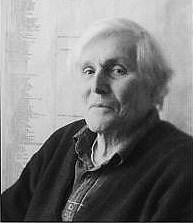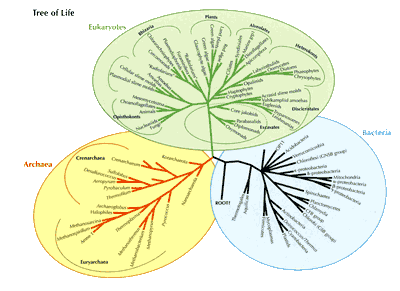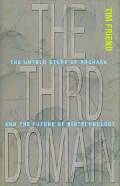Carl Woese: from scientific dissident to textbook orthodoxy
Gert Korthof updated 7 Aug 2009 (first published: 16 Oct 2007)
 The Third Domain. The untold story of Archaea and the future of biotechnology.
The Third Domain. The untold story of Archaea and the future of biotechnology.
by Tim Friend (2007),
Joseph Henry Press, hardback, 296 pages, illustrated.
The proposal of the Archaea as the third domain of life was attacked and ridiculed

Carl Woese 1928 – 2012
© Don Hamerman 2007
from Tim Friend (2007) The Third Domain.
Carl R. Woese died on December 30, 2012,
at the age of 84, according to the
Institute for Genomic Biology.
|
| |
Thirty years ago, in 1977, Carl Woese proposed that Archaea are different from bacteria and constitute a new super-kingdom Archaebacteria (1). By 1990 Woese adopted the term 'domain' for the three new branches of life and shortened the name Archaebacteria to Archaea. He wished to get rid of the term prokaryote alltogether. Despite he published in a top scientific journal (PNAS), his publication was not read widely. Furthermore, it was not greeted with enthusiasm by the scientific community. Especially, Salvador Luria, Nobel Prize winner in Medicine. Woese said Luria had not read the archaea paper when it was published in PNAS in 1977. Remarkably, this was not unusual: "it was the newspaper accounts of the discovery that most scientists first read" (5). The difference is that Luria reacted by deriding any notion of the possibility of a third domain of life. Even worse, Luria attempted to turn Ralph Wolfe, -an expert in methane-producing bacteria and colleague of Woese- against Woese.
"Wolfe recalls: 'One Nobel Prize winner, Salvador Luria, called me and said, 'Ralph, you're going to ruin your career. You've got to disassociate yourself from this nonsense!'" (5). The hostility, Woese said, was shocking. Others soon followed, crossing boundaries of common courtesy by making fun of Woese. He was called a crank and a crackpot, being neither a microbiologist nor an evolutionist (Woese was a physicist). 85 "Many leading biologists thought Woese was "crazy" and that his RNA tools couldn't possibly answer the question he was asking." (5). It was the outright dismissal of his work by people who never looked at his data that was a huge restraining factor in the research of Archaea and the origin of life. 64. As a consequence, he was not invited to conferences to speak about his work or defend it. The third domain was not rejected because of the data, but because it violated a central dogma, the eukaryote-prokaryote dichotomy. So rather than question the dogma, most biologists were content to condemn the finding. Their failure to question the dogma is one of the black marks in microbiology's history. 86,110. Evolutionary biologist Ernst Mayr (1904-2005), an icon of evolutionary biology, was one of a number of scientists who vigorously opposed Woese's (and Norman Pace's) suggestion that the catch-all term 'prokaryote' be banned from biology. Ernst Mayr joined the attacks in 1990 when Woese began naming archaea species as formal taxonomic units in the scientific literature. Until his death Mayr refused to accept that archaea represent a new domain of life (6). 87.
but 20 years later became mainstream science
Despite the initial criticism and the successful campaign to ignore Woese, he persisted with his research, continuing to build evidence for the third domain throughout the 1980s and 1990s. By the early 1990s archaea became widely accepted by microbiologists as a third domain of life. When the genome sequence of Methanococcus jannaschii was published in 1996, Science organized a press conference and announced the finding that Archaea was in fact a new domain of life. 88 According to Venter it took the genome sequence of Methanococcus jannaschii to convince everybody that Woese was right. Not every biologist accepts the three domains of life. Lynn Margulis has Five Kingdoms, and sticks to the superkingdom Prokarya including a subkingdom Archaea. She rejects the 'bacteriocentric three-domain scheme' because it is established solely by the criteria of molecular sequences (2). Even when the three domain classification of life is accepted, described and depicted, that does not mean Woese is mentioned (7).
and 30 years later became textbook orthodoxy

Three domains on the inside of the backcover of
the evolution textbook Nicholas Barton et al (2007) 'Evolution' (3).
|
In 2007, exactly 30 years after Woese's first publication, the evolution textbook Nicholas Barton et al (2007) stated: "The culmination of molecular systematics in studies of the Tree of Life came with the work of Woese and colleagues in the 1970s. ... Woese's evolutionary analysis of the rRNA data revealed a striking finding - the Tree of Life was divided into three main lineages, and one of these lineages had not previously been recognized. ... " (p.120: 3). There is not the slightest indication that Woese was initially ridiculed (and boycotted by Nobel Prize winner Salvador Luria). All struggle has been erased. This is not unusual for textbooks or more exactly: it is the rule. Richard Dawkins (2004) The Ancestors Tale is the only 'textbook' which hints at the initial controversy: "It was the great American microbiologist Carl Woese who discovered and defined the Archaea in the late 1970s. The deep separation from other bacteria was controversial at first because it was so different from previous ideas." (p. 449). In books about the origin of life there is only 'a delay', no hostility (4). Barton et al is not the first evolution textbook presenting the three-domain classification. Peter Skelton (1993) already presented Woese's universal tree of life in 'Evolution' (p.868). Textbooks where Woese is completely absent are Mark Ridley 'Evolution' second edition (1996) and third edition (2004), and Stearns and Hoeks (2005) 'Evolution' second edition (although Archaea are present!). Therefore, we are fortunate that Tim Friend documented it in his 'The Third Domain'.
In 1984, James Lake of the University of California, Los Angeles, and his colleagues challenged Woese's three-domain view of life (8).
At the end of the last century unique archaeal viruses were discovered. Viruses from Archaea turned out to be strikingly different from those of Bacteria, adding another nail to the coffin of the prokaryote/eukaryote paradigm. The findings of Carl Woese and co-workers have shown that the cellular world can be divided into three domains. The work of Wolfram Zillig and David Prangishvili show that a distinct viral world corresponds to the three cellular domains (9).
In 2003 Woese was awarded the Crafoord Prize
Woese was elected into NAS, the National Academy of Sciences in 1988. In 1992 Woese became the 12th recipient of microbiology's highest honor, the Leeuwenhoek Medal, given each decade by the Royal Netherlands Academy of Arts and Sciences (KNAW) in the name of Antonie van Leeuwenhoek, the inventor the microscope and discoverer of the microbial world.
Woese is both a Darwinist and a critic of Darwinism
Woese for the first time included prokaryotes in an evolutionary tree. Reconstructing the complete tree of life is the Darwinian research program. That is Darwinism. The tree of life embodies Common Descent of all life. On the other hand, Woese's data show that there is not one ancestor of all forms of life, but a network of life forms that frequently exchange DNA. So, maybe there is not a single root of the tree of life, but many roots instead. If Darwinism implies one cell as the ancestor of all life, then Woese would has refuted Darwinism. However, this matter is too complex to do justice here. Woese is very important for evolution, the genetic code and the origin of life. So, there is more to say about Woese.
Conclusion
Textbooks teach the third domain now as a matter of fact, but omit the initial hostile reaction to Woese. Darwinian dogma and prejudice can be effective on the short term, but on the long term data and reason will overcome resistance to new ideas.
Reasons for the delay in adopting the third domain:
- Personally: Woese was a solitary researcher and shy: "He seldom even attended the annual meetings of the American Society for
Microbiology (ASM) and so had few opportunities to argue in person on behalf of the Archaea."
"Invitations to give lectures and attend conferences poured in; true to form, Woese declined most". (5).
- Data: tiny snippets of rRNAs were considered too fragmentary to be reliable indicators of evolutionary relationships.
New evidence came in only later, for example: the complete sequence of the Archaea Methanococcus jannaschii (1996).
- Technique: Woese was considered a crank, who was using a crazy technique to answer an impossible question (5); He was one of "only two or three people in the world" to learn this backbreaking technique, he says, and he labored alone. "Carl was the only one who could read the films". (William Whitman, 5)
- Dogma: the eukaryote-prokaryote dichotomy was the central dogma of biology. Woese was making a claim of extraordinary scope. He was saying that we had missed one-third of all living things. People did not like that (5).
"I hadn't been trained as a microbiologist, so I didn't have this bias" [about impossibility of bacterial classification]. (Woese)

I based this review on chapter 3 of The Third Domain.
Grey numbers inserted into the text refer to pagenumbers of Tim Friends book.
Notes
- Carl R. Woese and George E. Fox (1977) Phylogenetic Structure of the Prokaryotic Domain: The Primary Kingdoms, PNAS, November 1, 1977 | vol. 74 | no. 11 | 5088-5090.
- Lynn Margulis and Karlene Schwartz (1998) Five Kingdoms. (Third edition).
- Nicholas Barton et al (2007) Evolution. (review)
- Christian de Duve (2006) Singularities (page 174) says "His findings yielded two totally unexpected conclusions" (my emphasis).
Robert Hazen (2005) Genesis. The scientific quest for life's origin wrote": "The universally acknowledge pioneer of molecular phylogeny is Carl Woese, a shy and retiring maverick who had to wait many years for widespread scientific acceptance of his ideas." (p. 138), "So contentious was this view of life that it took almost two decades to gain general acceptance. " (p.139). Hazen gives an incomplete explanation for the delay (p.139), and does not mention the active opposition of Salvador Luria.
- Virginia Morell (1997) Microbiology's Scarred Revolutionary, Science 2 May 1997: Vol. 276. no. 5313, pp. 699 - 702
- For example Ernst Mayr (2001) notes in What Evolution Is : "The number of known differences between prokayotes and eukaryotes is now about 30. The few differences between archaeabacteria and other bacteria pale by comparison". (p.46). To Mayr, evolution was 'an affair of phenotypes'.
- David A. Wharton (2002) Life at the limits. Organisms in extreme environments.. It is odd that for a book about organisms in extreme environments, Woese is not mentioned as the discoverer of the Archaea.
- Carl Zimmer (2009) 'On the Origin of Eukaryotes', Science 7 August 2009: Vol. 325. no. 5941, pp. 666 - 668.
- Patrick Forterre (2010) "Giant Viruses: Conflicts in Revisiting the Virus Concept", Intervirology June, 2010. [ 14 Jul 2014 ]
Reviews
- Sean Nee (2007) 'Introducing the extremophiles', Nature 448, 413-414 (26 July 2007).
Sean Nee is an evolutionary biologist at the School of Biological Sciences, University of Edinburgh, UK.
This is the review that made me buy the book.
- A review of The Third Domain by Tom Schmidt in Science, 14 Dec 2007.
"We find that Woese's discovery of the Archaea was greeted with skepticism by many and ridicule by others, including some very influential scientists." (no names!)
- Review by Lynn Margulis: The Third Domain: The untold story of Archaea and the future of biotechnology (Tim Friend), New Scientist, Volume 195, Issue 2619, 1 September 2007, Pages 50
Further Reading
- Kimura was also a critic turned into a mainstream scientst: (review).
- Short homepage of Carl Woese.
- Carl Woese according to wiki.
- Obituary: M. Judah Folkman (1933-2008), Nature 14 Feb 2008: "Folkman published his ideas about angiogenesis in 1971. This landmark paper initially met with scepticism. Undaunted, he and his small research group developed the cell-culture methods, bioassays and drug-delivery systems they needed to validate the theory."
- R.R. Gutell (2013) 'You tell Carl that some of my best friends are Eukaryotes: Carl R. Woese (1928–2012)', RNA. 19:vii-xi. (Obituary)
- Carl R. Woese (2004) A New Biology for a New Century, Microbiol. Mol. Biol. Rev. June 2004 vol. 68 no. 2 173-186 (free). A huge, and very important article, almost the length of a book. Contains his vision for the future.
- Carl R. Woese and Nigel Goldenfeld (2009) 'How the Microbial World Saved Evolution from the Scylla of Molecular Biology and the Charybdis of the Modern Synthesis', Microbiology and Molecular Biology Reviews, March 2009, p. 14-21, Vol. 73, No. 1. (free)
- "There must be no barriers for freedom of inquiry. There is no place for dogma in science. The scientist is free, and must be free to ask any question, to doubt any assertion, to seek for any evidence, to correct any errors."
- "What makes the treatment of evolution by biologists of the last century insufferable scientifically is not the modern synthesis per se. Rather, it is the fact that molecular biology accepted the synthesis as a complete theory unquestioningly–thereby giving the impression that evolution was essentially a solved scientific problem with its roots lying only within the molecular paradigm."
- "Perhaps there is no clearer demonstration of the hollowness of the modern evolutionary synthesis in its claim to be a full account of the evolutionary process than the unfortunate circumstances of its encounter with microbiology."
- "There are now compelling documentations of horizontal gene transfer in eukaryotes, not only in plants, protists, and fungi, but in animals (including mammals) as well"
- Jan Sapp (2008) "The iconoclastic research program of Carl Woese", chapter 17 in: Oren Harman and Michael Dietrrich (2008) Rebels, Mavericks, and heretics in biology Yale University Press, hb 400 pages.
This is a usefull chapter discussing Woese's contribution to microbial phylogeny. Oddly, he omits the hostility to Woese.
- Jan Sapp (2009) The New Foundations of Evolution: On the Tree of Life. xx + 425 pp. Oxford University Press.
"Sapp tells how Woese gathered evidence to support the tree, forged a successful collaboration with Otto Kandler of Germany, and encountered resistance from prominent scientists and scientific journals."
"The heroes of Sapp's book (because it is that kind of history) are Carl Woese and his colleagues".
- Harry Noller (2013) Carl Woese (1928–2012). Discoverer of life's third domain, the Archaea. Nature, 31 jan 2013:
- "At first, Woese's discovery of the Archaea was met with scepticism and even hostility. This, combined with Woese's view of himself as a rebellious outsider, resulted in an often polemical writing style. He took on adversaries as formidable as microbiologist Roger Stanier, taxonomist Ernst Mayr and even Charles Darwin. Yet Woese eventually received the recognition he deserved, including the Crafoord Prize in Biosciences from the Royal Swedish Academy of Sciences in 2003. ...
His wife Gabriella became so concerned that she persuaded him to let her open the envelopes; among them, she found one with a months-old Dutch postmark. The letter informed Carl that he had been awarded the Leeuwenhoek Medal by the Royal Netherlands Academy of Arts and Sciences – an honour that is given only once a decade and that he shares with Louis Pasteur."
- David Quammen (2018) The Tangled Tree: A Radical New History of Life. Simon & Schuster
reviewed in Nature 2 Aug 2018. The Tangled Tree traces the full arc of Woese's life and career.
- A student of Woese wrote a blog about his experiences: A tribute to Carl Woese Oct 3. [ 5 Oct 2022 ]
|



